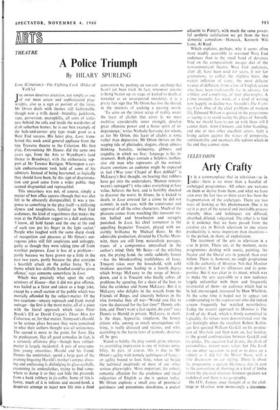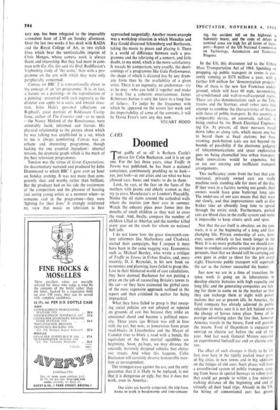Arty Crafty
TELEVISION The treatment of the arts in television is a case in point. There are, at the moment, more programmes dealing with music, painting, the theatre and the liberal arts in general, than ever before. There is, however, no single programme with the authority of Monitor. Not that Monitor was perfect. It had its sillinesses and its porn- posities. But it was clear in its intent, which was to make the arts accessible to a new audience largely unfamiliar with them and frequently mistrustful of them—an audience which had to be led, encouraged, reassured by Huw Wheldon. At the same time it hoped not to appear too condescending to the cognoscenti who did indeed scream frequently but watched nevertheless. Today the nearest approach to Monitor is The Look of the Week, which is firmly committed to topicality. Its virtues were demonstrated over the last fortnight when the excellent Robert Robin- son first quizzed William Gaskill on his produc- tion of Macbeth and then went on, last Sunday, to the grand confrontation between Gaskill and his critics. The occasion had drama, the clash of personalities, instant news value; but The Look has on other occasions to pad or to dress up a subject as it did for the Motor Show, with a trite discussion on car styling. There is about the programme a certain bleakness, due in part to the convention of shooting in a kind of limbo where the physical relations between speakers are undefined and there is no geography.
On ITV, Tempo, once thought of as the chat- !enge to Monitor, now increasingly a documen- tary sop, has been relegated to the impossibly somnolent hour of 2.30 on Sunday afternoon. Over the last two weeks it has dealt with RADA and the Royal College of Art, in two stylish films which bear the unmistakable imprint of Chris Menges, whose camera work is always fluent and interesting. But they had more in com- mon with Go, Go, Go said the Bird, Rediffusion's frightening study of 'the scene,' than with a pro- gramme on the arts with which they were only peripherally concerned.
Canvas on BBC 2 is conventionally closer to the concept of an 'art programme.' It is, in fact, a lecture on a painting—or the reproduction of a painting—presented with such ingenuity as the director can apply to a static and limited situa- tion. John Hale's personal reflections on Raphael's great portrait of Baldassare Castig- lione, author of The Courtier and—so to speak —the Nancy Mitford of the Renaissance, were admirably lucid, informed and literate. His physical relationship to the picture about which he was talking was established in a set, which to me is always comforting. Canvas was an urbane and interesting programme, though lacking the one essential ingredient: internal tension, the dramatic graph which is the mark of the best television programmes.
Tension was the virtue of Great Expectations, the documentary narrated and produced by John Drummond to which BBC 1 gave over an hour on Sunday evening. It was not more than com- petently shot, and worthy rather than brilliant. But the producer had on his side the excitement of the competition and the pleasure of hearing and seeing young artists at a moment when—as someone said in the programme—they were 'fighting for their lives.' It strongly reinforced my view that music on television is best approached tangentially. Another recent example was a workshop situation in which Menuhin and Ray Gould discussed Schoenberg and Beethoven, taking the music to pieces and playing it. There is a world of difference between such a pro- gramme and the televising of a concert, and little doubt, to my mind, which is the more satisfactory. It reveals by comparison, very cruelly, the short- comings of a programme like Gala Performance, the shape of which is dictated less by any dram- atic form than by the availability of a given artist. There is no ingenuity, no anchorman—try as he may—who can hold it together and make it look like a coherent entertainment. James Robertson Justice is only the latest in a long line of failures. To judge by the frequency with which he appeared on the screen last week and the improbability of some of the contexts, it will be David Frost's turn any day now.
STUART HOOD



































 Previous page
Previous page